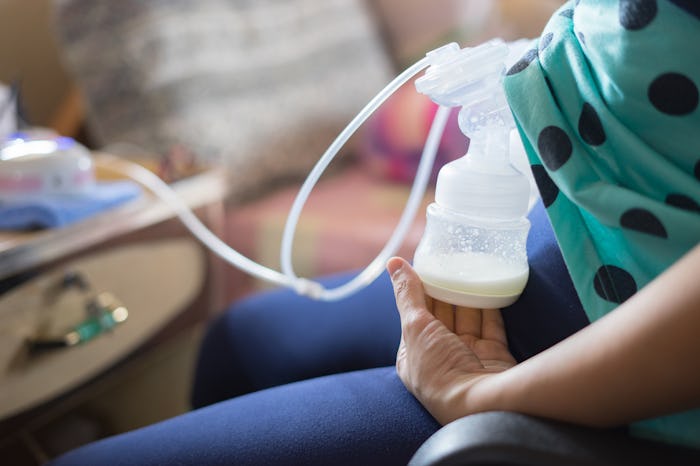While Republicans are aiming to roll back much of the Affordable Care Act with their proposed 2019 budget that calls for massive cuts to healthcare assistance, breastfeeding support remains thus far unscathed. The ACA required health plans — for the first time — to cover the cost of breastfeeding support and equipment for nursing moms, which allows them to obtain breast pumps through their insurance, according to TIME. Of course, this is a huge victory for breastfeeding moms in the United States but, inevitably, there are still a lot of questions surrounding the specifics — like how exactly does one obtain a breast pump through their insurance for free (especially before the ACA is repealed)?
Women across the country have benefited from the law for a gamut of reasons. Four million women give birth in the United States each year, and more than 80 percent choose to breastfeed, according to the Centers for Disease Control and Prevention (CDC). And breastfeeding pumps would would cost on average from just under $50 (for manual pumps) to more than $200 (for electrical pumps that include a carrying case and an insulated section for storing milk containers), according to the Central Carolina OBGYN, if not for the ACA requiring insurance companies to cover the cost as part of women’s preventative care. These pumps are considered essential health benefits under the law.
Leading health bodies such as the World Health Organization recommend that babies be exclusively breastfed for six months, and then continue to nurse for two years. But the United States does not guarantee paid family leave, which makes breastfeeding an impossible feat for some moms who need to return to work after childbirth. Perhaps that's why only a small percentage of women (1.6 percent) are pregnant and employed, according to the National Women’s Law Center.
Ultimately, breast pumps make life easier for new moms — and working moms in particular. And the ACA also covers certain preventive services including comprehensive lactation support, supplies, and counseling to help moms even further, according to the Health Resources and Services Administration.
"I am fortunate to own a double electric breast pump — an expensive device that lets me express milk from both breasts simultaneously and therefore save time," wrote Andrea Prasow, Deputy Washington Director for Human Rights Watch.
Her pump would have cost her hundreds of dollars if it wasn't 100 percent covered by her insurance company. And she noted that it's not just working moms like herself who need the maternal support, too.
"A pump lets women return to work, attend school, care for elderly family members, or just have a few hours away from her baby," Prasow wrote, according to Human Rights Watch.
So how exactly do you get a breast pump for free through your insurance, just as Prasow did? Molly Petersen, certified lactation counselor (CLC) at Lansinoh, wrote on the brand's site that it all comes down to your insurance plan. "Coverage varies depending on your insurance, but most moms can get a double electric breast pump like the our Smartpump or SignaturePro for free," she explained.
"Often, your insurance company will use a durable medical equipment provider (DME) to fulfill your breast pump benefit," she says. Once you know you're pregnant and plan on breastfeeding, reach out to your insurance company to find out which DMEs they work with and if a breast pump is fully covered. The DME will be able to tell you which specific models are available.
The Lansinoh team believes that breast is best and are taking steps to assist nursing mothers to help them with their breastfeeding journey, and helping moms access pumping gear is just one piece of the puzzle.
This page makes it easy for moms — after providing their state and insurance information, it connects them with resources to help them get a pump.
The future of healthcare services in this country is unknown but, for now, rest assured that breast pumps are still covered.
Editor's note: After publication, we discovered this article did not meet our editorial standards. There were portions that did not correctly attribute another source. It has been updated to meet our standards.
Check out Romper's new video series, Bearing The Motherload, where disagreeing parents from different sides of an issue sit down with a mediator and talk about how to support (and not judge) each other’s parenting perspectives. New episodes air Mondays on Facebook.
